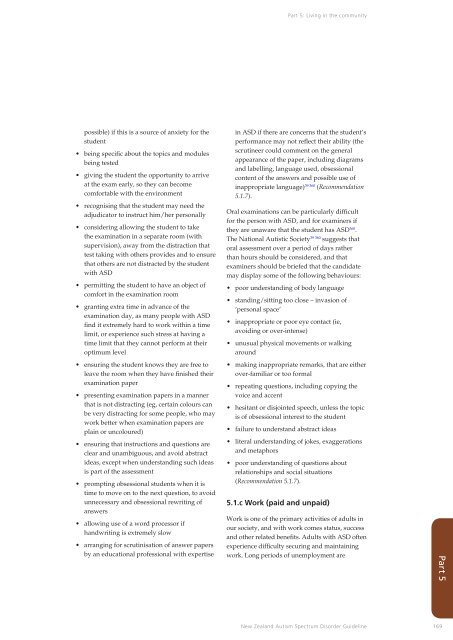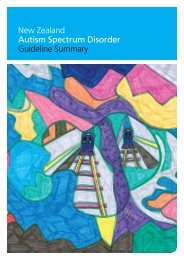New Zealand Autism Spectrum Disorder Guideline - Ministry of Health
New Zealand Autism Spectrum Disorder Guideline - Ministry of Health
New Zealand Autism Spectrum Disorder Guideline - Ministry of Health
You also want an ePaper? Increase the reach of your titles
YUMPU automatically turns print PDFs into web optimized ePapers that Google loves.
Part 5: Living in the community<br />
possible) if this is a source <strong>of</strong> anxiety for the<br />
student<br />
• being specific about the topics and modules<br />
being tested<br />
• giving the student the opportunity to arrive<br />
at the exam early, so they can become<br />
comfortable with the environment<br />
• recognising that the student may need the<br />
adjudicator to instruct him/her personally<br />
• considering allowing the student to take<br />
the examination in a separate room (with<br />
supervision), away from the distraction that<br />
test taking with others provides and to ensure<br />
that others are not distracted by the student<br />
with ASD<br />
• permitting the student to have an object <strong>of</strong><br />
comfort in the examination room<br />
• granting extra time in advance <strong>of</strong> the<br />
examination day, as many people with ASD<br />
find it extremely hard to work within a time<br />
limit, or experience such stress at having a<br />
time limit that they cannot perform at their<br />
optimum level<br />
• ensuring the student knows they are free to<br />
leave the room when they have finished their<br />
examination paper<br />
• presenting examination papers in a manner<br />
that is not distracting (eg, certain colours can<br />
be very distracting for some people, who may<br />
work better when examination papers are<br />
plain or uncoloured)<br />
• ensuring that instructions and questions are<br />
clear and unambiguous, and avoid abstract<br />
ideas, except when understanding such ideas<br />
is part <strong>of</strong> the assessment<br />
• prompting obsessional students when it is<br />
time to move on to the next question, to avoid<br />
unnecessary and obsessional rewriting <strong>of</strong><br />
answers<br />
• allowing use <strong>of</strong> a word processor if<br />
handwriting is extremely slow<br />
• arranging for scrutinisation <strong>of</strong> answer papers<br />
by an educational pr<strong>of</strong>essional with expertise<br />
in ASD if there are concerns that the student’s<br />
performance may not reflect their ability (the<br />
scrutineer could comment on the general<br />
appearance <strong>of</strong> the paper, including diagrams<br />
and labelling, language used, obsessional<br />
content <strong>of</strong> the answers and possible use <strong>of</strong><br />
inappropriate language) 39 360 (Recommendation<br />
5.1.7).<br />
Oral examinations can be particularly difficult<br />
for the person with ASD, and for examiners if<br />
they are unaware that the student has ASD 360 .<br />
The National Autistic Society 39 360 suggests that<br />
oral assessment over a period <strong>of</strong> days rather<br />
than hours should be considered, and that<br />
examiners should be briefed that the candidate<br />
may display some <strong>of</strong> the following behaviours:<br />
• poor understanding <strong>of</strong> body language<br />
• standing/sitting too close – invasion <strong>of</strong><br />
‘personal space’<br />
• inappropriate or poor eye contact (ie,<br />
avoiding or over-intense)<br />
• unusual physical movements or walking<br />
around<br />
• making inappropriate remarks, that are either<br />
over-familiar or too formal<br />
• repeating questions, including copying the<br />
voice and accent<br />
• hesitant or disjointed speech, unless the topic<br />
is <strong>of</strong> obsessional interest to the student<br />
• failure to understand abstract ideas<br />
• literal understanding <strong>of</strong> jokes, exaggerations<br />
and metaphors<br />
• poor understanding <strong>of</strong> questions about<br />
relationships and social situations<br />
(Recommendation 5.1.7).<br />
5.1.c Work (paid and unpaid)<br />
Work is one <strong>of</strong> the primary activities <strong>of</strong> adults in<br />
our society, and with work comes status, success<br />
and other related benefits. Adults with ASD <strong>of</strong>ten<br />
experience difficulty securing and maintaining<br />
work. Long periods <strong>of</strong> unemployment are<br />
Part 5<br />
<strong>New</strong> <strong>Zealand</strong> <strong>Autism</strong> <strong>Spectrum</strong> <strong>Disorder</strong> <strong>Guideline</strong> 169











